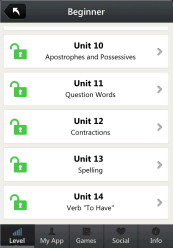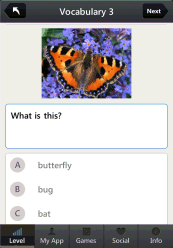English Grammar - Beginner
Some And Any
Go To Quizzes >>> Some and Any
We use some and any to talk about quantities of things or something without specifying how much.
I have four pens and six envelopes. We know how many.
BUT I have some pens and some envelopes. We don't know how many here.
Usually we use some and any like this:
|
Positive |
Negative |
Question |
|
some |
any |
any |
English Learning Lounge - iOS and Android Apps |
||

|
Our app for both Android and iOS to help you improve your English!
|

|
Examples:
We have some beer for the party.
We don't have any beer for the party.
Do we have any beer for the party?
We also use some in questions that either offer or request something.
Would you like some wine with your dinner, sir?
Can I have some more potatoes please?
Capital Letters
Go To Quizzes >>> Capital Letters
The rules about using capital letters are different in English compared to other languages.
We use capital letters for:
Countries and Cities.
Bucharest is in Romania.
Months of the year and public holidays.
Christmas is always in December.
Nationalities.
He has Swedish car.
Languages.
He speaks Spanish very well.
Rivers, Bridges, Theatres, Lakes, Mountains, etc.
The Himalayas are north of India.
Charles Bridge goes over the Vltava River in Prague.
All names of people.
Charles Rider and William Wilson both live in Toronto.
We don't use capital letters for:
Seasons of the year.
My birthday is in the spring.
Animals
The lion chased the baby elephant.
Compass Directions.
Boston is north of New York.
Simple Verb Patterns
Go To Quizzes >>> Simple Verb Patterns
Verbs combine in different ways in English. When two verbs come together there are three possibilities:
Pattern 1.
1st Verb + 2nd Verb in ____ing form.
Verbs that take this pattern include enjoy and finish.
When I finished cooking, we ate dinner.
I enjoy spending my weekends at my beach house.
Pattern 2.
1st Verb + 2nd Verb in to ____ form.
Verbs that take this pattern include want, hope and decide.
I want to go to Spain for a year when I finish university.
I hope to find a job there as an English teacher.
He decided to come to the cinema eventually.
Pattern 3.
1st Verb + 2nd Verb without "to".
Modal Verbs like can, will and should take this form plus other verbs such as let.
I can come to the party at eleven o'clock.
He should study more if he wants to pass.
My teacher doesn't let us talk in class.
Some verbs can take both pattern 1 and pattern 2. These include like, love, hate and begin.
I like to go swimming at the weekends.
I like going swimming at the weekends.
Attention. When you learn a new verb, ask your teacher or use a dictionary to find out how it combines with other verbs.
